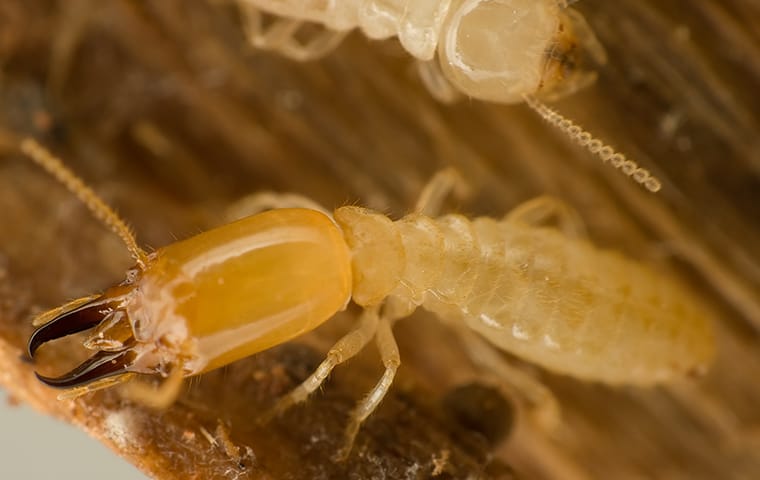What are termites?
Termites are environmentally important pests. In nature, they help to break down decaying branches, logs, stumps, and other plant matter, turning it back into useful organic material. However, when termites set their sights on the wood found in homes and other structures as a food source, they are no longer helpful insects but destructive pests. Termites are responsible for causing over five-billion dollars in damages all throughout the United States each year.

Subterranean termites are insects that nest in the ground, traveling back and forth from their wooden food source to their nest each day. These termites live and work together in large colonies. Each member has their job to do to help maintain the colony and are divided into three distinctive groups or castes: reproductives, workers, and soldiers.
Are termites dangerous?
When it comes to the structural integrity of your home or business, termites are very dangerous pests. They pose no direct dangers to people; in fact, we rarely ever come into contact with them. Termites can find their way into any property through small cracks in the foundation as they forage for food. Once inside, they begin feeding on its structural wood, working night and day to gather food for their colony. Termites are active year-round and are responsible for causing costly and extensive structural damage. Additionally, the damage termites cause is something that most homeowners’ insurance does not cover.
Why do I have a termite problem?
You most likely have a termite problem because termites are either nesting on your property or a neighboring property. Things like leaky fixtures, pipes, and clogged gutters allow excess moisture to build up around the exterior of your property and seep into its walls. Attracted to areas of excess moisture, subterranean termites most often find their way into homes, businesses, and other structures through deck posts, door frames, wood shingles, and porch steps or supports that come into contact with the ground. Termites are capable of feeding on sound wood, but wood that is decaying and riddled with fungi is much easier for them to consume.
Where will I find termites?
Termites feed on structural wood (preferring water-damaged wood) located above ceilings, below floors, and behind walls. Over time, they may also begin to feed on sound wood and non-wooden items like paper. Subterranean termites are usually found either in their underground nest or inside the wooden structures they're feeding on. The only time people may see termites is during a swarm; swarms occur when the winged reproductives emerge from a mature colony to mate and begin a new one.
How do I get rid of termites?
For home and business owners who want to eliminate termites from their property, partnering with a professional is the best way to be successful. At Jury Pest Services, we provide exceptional pest solving strategies that will eliminate subterranean termites and prevent their return. Our green pest control solutions protect the environment, while still being effective against our area’s toughest pests. Serving All Georgia and South Carolina Counties in the Entire CSRA and Beyond with Liquid Termite Treatments and Termite Bait Options, Jury Pest Services is committed to our customers and to providing trustworthy pest control services. We also provide our professional services to homes and businesses in Columbia County, GA, Edgefield County, SC, Barnwell County, SC, and beyond. To learn more about our termite control services, contact Jury Pest Services today!
How can I prevent termites in the future?
In addition to the professional termite control services you’ll find at Jury Pest Services, use the following tips to help prevent problems with termites:
-
Clean gutters and downspouts often to prevent water from pooling around your foundation.
-
Remove firewood, fallen trees, tree stumps, and excess piles of organic debris from your property.
-
Leave a rock or crushed stone barrier between any soil or mulch and your foundation.
-
Get rid of water-damaged wood in and around your home or business.
-
Replace mulch with crushed rock, rubber mulch, or other non-cellulose based options.
-
Fix leaky pipes and use dehumidifiers to reduce moisture levels in your home or business.
-
Place weatherstripping around windows and doors to prevent water from seeping into your walls.
Schedule An Inspection Today!
Complete the form below to request an inspection.
 Reviews
Reviews